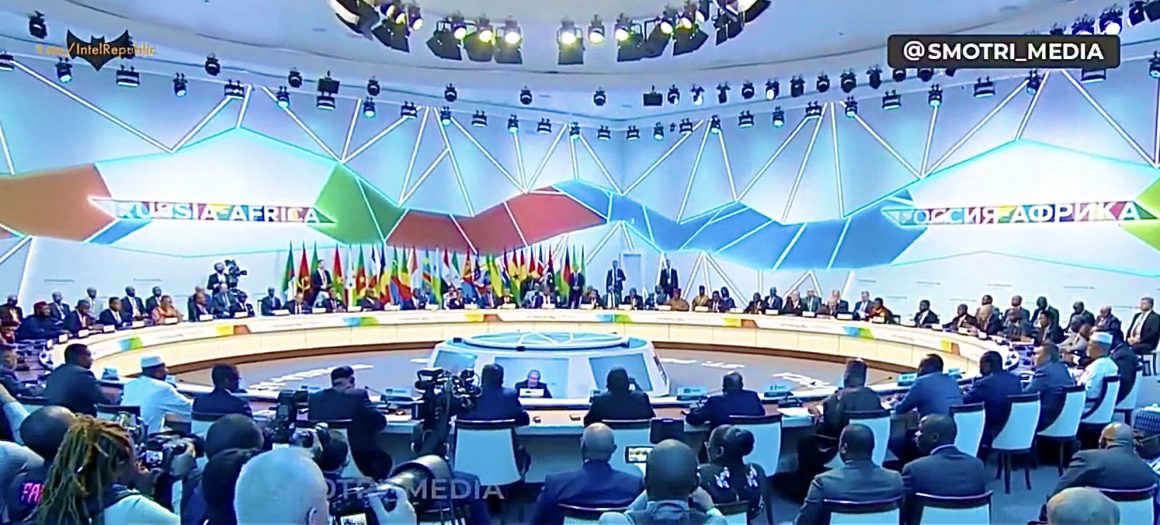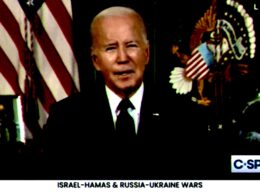Above: this month’s Russia-Africa summit
The backfiring of Biden’s Ukraine proxy war—which the president himself has implicitly admitted to be a failure with his “Ukraine can’t join NATO till it’s won” ultimatum—has necessitated that the empire shift towards a new front in the great-power competition. This front is going to be a campaign of hybrid warfare against BRICS, and against any countries that assist in China’s efforts to help lead BRICS.
Obscuring China’s recent successes to make it look like the war on BRICS can be won
This campaign hasn’t officially started yet; Washington hasn’t so far expanded its hybrid attacks against China and Russia to Brazil, India, South Africa, or the other “swing state” players within the new cold war. At the most, Washington and its narrative agents are at the moment merely putting forth propaganda to try to demoralize China, as well as anybody who supports multipolarity.
We’re seeing this in headlines like the one this week from Bloomberg—the publication whose owner Mike Bloomberg is personally sympathetic towards China, yet has ultimately conformed to the State Department-aligned media culture it inhabits. Bloomberg declares:
“BRICS Membership Expansion Push by China Falters as India, Brazil Push Back”
This attempt to influence one’s perceptions when they Google things like “BRICS” or “China Brazil relations” is aided by another headline from the South China Morning Post, the separatist-sympathetic Chinese publication:
“Views of China ‘broadly negative’ in India and Brazil, survey finds”
If the only news you’ve been seeing about BRICS comes from these statements which the empire’s algorithmic digital platforms are designed to push, you must think Washington has a chance of subduing the PRC in the post-Ukraine diplomatic contest. Look a little deeper though, and you find there’s much context that these headlines omit. Iran’s Press TV has reported that Brazil, along with numerous other countries, have been acting friendlier towards China than not:
In Brazil, at the end of 2022, the yuan surpassed the Euro as the second most important currency in foreign reserves. At that time, 5.37% of the assets of the central bank of the country were in Chinese currency and 4.74% were in Euro. Now in Bolivia, after months of severe shortage of dollars, the use of yuan begins. The sweeping US sanctions on Russia in the wake of the Russia Ukraine war sent a warning to the rest of the world about the risks of the US using the dollar as a tool for geopolitical gain. Several countries are looking to move away from their dollar dependence and China is promoting the Yuan as an alternative. China has become a major rival for the United States, a rivalry that is increasing on many levels. Last Month, Pakistan paid for its first shipment of crude oil from Russia in the Chinese Yuan. In February, the Central Bank of Iraq, a major oil supplier, announced that it would allow trade with China to be settled in the Yuan for the first time. Members of the China dominated Shanghai Cooperation Organization, the SCO, agreed to increase trade in their local currencies. Brazil is also leading the call to move away from the dollar. When Brazil’s President, Lula da Silva, visited China earlier this year, he blasted the monstrous role of the US dollar in the global economy.
The long-term trend, whether with Latin American countries, with Eurasian imperialist victims like Pakistan, or with non-aligned actors like South Africa, is an increasingly comfortabe attitude towards the PRC. Assuming the survey data SCMP cites is totally accurate, this broader economic, financial, and diplomatic shift towards accommodating China is still the most important part of the story. A reality which shows that ultimately, peoples across all parts of the globe have more of a material incentive to become pro-China. Large amounts of the people across Africa have already come to love China, due to the ways the PRC has provided their continent with the tools to lift itself out of colonial poverty. The only reason the same levels of affection for China don’t exist in Brazil and India is because these places haven’t (yet) had China repair the damages that international monopoly capital has done to their societies.
And regardless of whatever suspicions towards China still exist within these countries, the practical reality is that they’ll have to embrace China in order to succeed. As Hu Weijia of Global Times has written in response to an Indian official’s statement this week that India is open to greater Chinese investment, it would be in the country’s interests to prove this statement isn’t hollow diplomacy:
India’s huge market is attractive to global manufacturers. Over the past decade, many Chinese companies have been attracted by India’s market and strengthened their operations in the country. Some have achieved great commercial success. Observers believe that India’s eagerness to reap profits from these foreign companies through crackdowns has seriously hindered the development of these companies in the Indian market. If India repeatedly does this, it will in turn undermine its own market reputation. This means India will find it difficult to translate its market potential into economic and manufacturing development opportunities. It is hoped that India can seize the opportunities for manufacturing development, change its attitude toward Chinese enterprises, truly adopt an open attitude toward Chinese manufacturers, and provide a fair investment environment for them.
Such additional victories for Chinese global relationship-building are so far only hypothetical, yet the nature of the present trends prove they absolutely can happen. The western headlines may gloat about the fact that international wariness towards China still exists, but they have to leave out the ways China is succeeding at building the multipolar order. That’s all the information we need to conclude that the “Russiagate” psyop, whose ultimate purpose was to prevent the rise of BRICS, has overall failed.
The psyop that could only do so much for the empire
I bring up Russiagate because it’s the big psyop of the last decade; the all-encompassing conspiracy narrative that the empire’s propagandists have sustained following its refutation in 2019, due to how instrumental it is for justifying the new cold war. It’s solidified the American left’s preexisting trend towards neocon views on Syria; Assad has come to be viewed by liberals and lib-“lefts” as a leader who must be destroyed in order to counter the biggest villain Putin. Russiagate has also made the American left either supportive of the Ukraine effort; or inclined to denounce both sides in this conflict between anti-imperialism and actual fascism.
The fact that plenty of these anti-Russia leftists at the same time claim to be pro-China has aided the narrative efforts behind the anti-BRICS hybrid war; if many of those who in theory oppose the attacks against China have become willing to oppose actions which further the transition to multipolarity, the war on BRICS is made easier. This isn’t just because these elements of the left are against Russia’s efforts to solidify the multipolar world order; it’s because they’ve also taken the stance that helping in the information war against imperialism’s psyops is optional. They’ve decided to be apathetic towards the fight against their own government’s imperial crimes.
By taking advantage of this hypocrisy and lack of integrity which defines the American left, the empire’s narrative managers have cultivated a discourse that makes the hybrid war possible. In domestic terms they’ve been able to sustain their victories, due to the help they’ve gotten from those who are supposed to represent a revolutionary opposition. It’s like how our ruling elites broadly continue to win the domestic class war, due to this war’s pro-worker side being led by unprincipled actors who appease the Democratic Party.
Yet in international terms our situation, from a revolutionary perspective, is more hopeful than it’s been in a long time. In 2018, when Russiagate had just fully overtaken conventional “left” thinking in the United States, the commentator Caitlin Johnstone clarified that the psyop’s ultimate goal wasn’t to influence domestic politics; it was rather to influence global politics:
China has been collaborating with Russia to end the hegemony of the US dollar, to shore up control of the Arctic as new resources become available, and just generally build up its own power and influence instead of working to remain in Washington’s good graces as most western nations have chosen to do. Preventing this is the single most important goal of the US power establishment, not just its elected government but the unelected plutocrats, defense and intelligence agencies which control the nation’s affairs behind the scenes. This agenda is so important that in a letter to his successor the outgoing President Barack Obama made the “indispensable” nature of American planetary leadership his sole concrete piece of advice, and pro-establishment influence firms like Project for a New American Century have made preventing the rise of a rival superpower their stated primary goal. This is what Russiagate is ultimately about. Democrats think it’s about impeaching Trump and protecting the world from a nigh-omnipotent supervillain in Vladimir Putin, Trump’s supporters think it’s a “deep state coup” to try and oust their president, but in reality this has nothing to do with Trump, and ultimately not a whole lot to do with Russia either. When all is said and done, Russiagate is about China.
Five years later, after Washington’s capacity to inflict damage has gotten tested in Ukraine, it’s been proven that Russiagate never truly had hope for reversing the shift to multipolarity. After Russia’s clear victory in the economic war; effective victory in the military war; and consequential successes at advancing China’s BRI, Putin has been able to triumphantly declare at this month’s Russia-Africa summit: “Based on the principles of justice and equality, they [Africa’s fighters of colonialism and apartheid] firmly defended the independent path of development of their peoples, often at the cost of their own lives. These ideals of freedom, independence, sovereignty are very significant even now, in the current difficult conditions of international turbulence, when a truly multipolar world is being formed, and the era of hegemony of one or several states is fading into the past. But not without the resistance of those who are accustomed to their own exclusivity and monopolies in world affairs.”
By telling the people the truth about just how much hope there now is for the defeat of U.S. hegemony, we Marxists in the heart of the beast who haven’t abandoned our revolutionary principles can incentivize the people to rally against our government’s destructive schemes. We can build an effective anti-imperialist movement, and thereby free the workers movement from the Democrat Party’s control; as the Democrats depend on an environment of apathy and complacency on imperialism within radical spaces. By letting the cause to advance multipolarity inform our outlook and our practice, we can build an authentic opposition towards capital. One that’s capable of defeating the empire from within.
————————————————————————
If you appreciate my work, I hope you become a one-time or regular donor to my Patreon account. Like most of us, I’m feeling the economic pressures amid late-stage capitalism, and I need money to keep fighting for a new system that works for all of us. Go to my Patreon here.
To keep this platform effective amid the censorship against dissenting voices, join my Telegram channel








